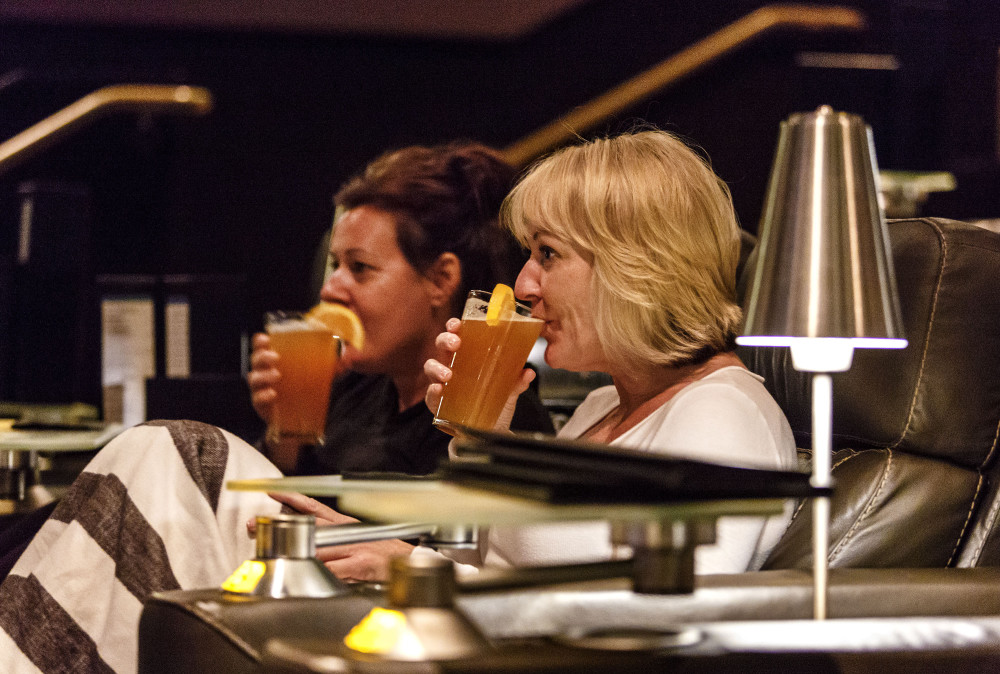By Richard Verrier
Los Angeles Times.
The bartenders were working overtime on a typically busy Saturday night at Cinepolis Luxury Cinemas in suburban Los Angeles.
All eight screens were sold out and the barkeeps were serving up craft beers, glasses of Chardonnay and $15 movie-themed cocktails to go with truffle fries and gourmet cheese plates.
A dozen black-clad waiters shuttled back and forth to serve customers in the hotel-like lounge and in darkened auditoriums, where patrons relaxed in plush recliners while ordering drinks like Murphy’s Law, a Jack Daniels concoction inspired by the upcoming science-fiction movie “Interstellar.”
“It’s awesome,” said McKenzie Ferguson, a 21-year-old college student, sipping a cocktail called the Galaxy with her boyfriend at the bar before a screening of “Gone Girl.” “It’s so different. It’s like a combination of a night out. You go to a bar and you go to see a movie in one place.”
Cinepolis is one of several theater chains that are ginning up a growing business by selling beer, wine and cocktails along with $20-plus movie tickets, popcorn and soda. Expect to see this kind of service coming to a theater near you.
Major circuits and independent theater companies are discovering that booze is a small but highly profitable line of business, providing a much-needed tonic for an industry that has struggled with long-term attendance declines and is looking for new ways to lure patrons.
Theaters are investing heavily in new bars and lounges, along with reserved seating, reclining seats and in-theater dining. They are among an array of premium services aimed at keeping consumers at theaters for longer periods, spending cash they would otherwise spend at a local bar or restaurant.
More important, theater executives say, they provide another incentive for patrons to watch movies on the big screen.
Box-office revenue has dropped this year, with ticket sales this summer plummeting to their lowest level in 17 years when adjusted for inflation.
But alcohol sales have been a bright spot for theater chains like Cinepolis. The Mexican company, Latin America’s largest movie chain, expanded into Southern California in 2011 and now has five luxury theaters in the region that sell beer, wine and cocktails along with gourmet food.
Cinepolis USA says it generates about 10 percent of its revenue from alcohol sales, which represent nearly one-third of the company’s food and beverage sales. Cocktail sales grew 11 percent in the last year, according to the company.
“We were thinking, what don’t you currently get at a movie theater?” said Adrian Mijares Elizondo, chief executive of Cinepolis USA. “Alcohol has been very well received by some of our adult guests who enjoy having a beer or a glass of wine when watching a movie, just like you would when watching a movie in your home.”
Several independent theater chains also have expanded premium food and beverage services, such as Landmark Theaters and ArcLight Cinemas. Robert Redford’s Sundance Cinemas in 2012 remodeled the former Sunset 5 theater in West Hollywood with a bistro and beer and wine bar.
Gold Class Cinemas pioneered the concept of allowing patrons to order food and drinks from their seats when it opened its theater in Pasadena in 2009.
IPic, which has 10 theaters, offers handcrafted cocktails prepared from local ingredients. The company hired celebrity mixologist Adam Seger to develop its bar and drinks program. He’s featured during the cinema pre-show. Customers also can make their own drinks, using ingredients picked from images displayed on an iPad at their seats.
“We’re doing things that you don’t see at top cocktail bars,” said Hamid Hashemi, CEO of iPic Entertainment. “Frankly, alcohol sales is for us what popcorn is to traditional theaters.”
And competition is heating up. Alamo Drafthouse, the Austin, Texas-based chain known for serving beer in movie theaters, recently announced plans to expand into downtown Los Angeles.
Big chains also see opportunity in spirits.
AMC Entertainment, which operates the nation’s second-largest theater chain, doesn’t disclose alcohol sales figures but says there is growing demand for its bar concept, called MacGuffins Bar and Lounge. The Leawood, Kan., chain has opened 85 bars and lounges in its theaters in the last 36 months.
Theaters are merely following a pattern that has already been successful for other entertainment venues such as ballparks and theme parks, said George Patterson, senior vice president of food and beverages for AMC Entertainment.
“We did a little research a couple of years ago and found that adult consumers might consider coming back to the movie business if alcohol was offered,” he said. “Guests love it. A glass of wine really improves a bad movie.”
Problems with rowdy customers are rare, Patterson and other executives say.
Securing an alcohol license, however, can be time-consuming and difficult. State Alcoholic Beverage Control license regulations vary in different cities and counties. Some areas limit alcohol sales to auditoriums designated for those 21 years and older, while others allow alcohol to be served in general audience auditoriums, with identification checks.
The booze-in-theaters trend has been a welcome new source of revenue for local brewers.
“It’s allowing us to go into whole new channels of business that we weren’t thinking about two years ago,” said Chad Heath, senior director of Stone Brewing Co. in Escondido, Calif., which supplies craft beers to Cinepolis and ArcLight. “These accounts are high-volume bars. It’s significant business for us.”














































































































































































































































































































































































